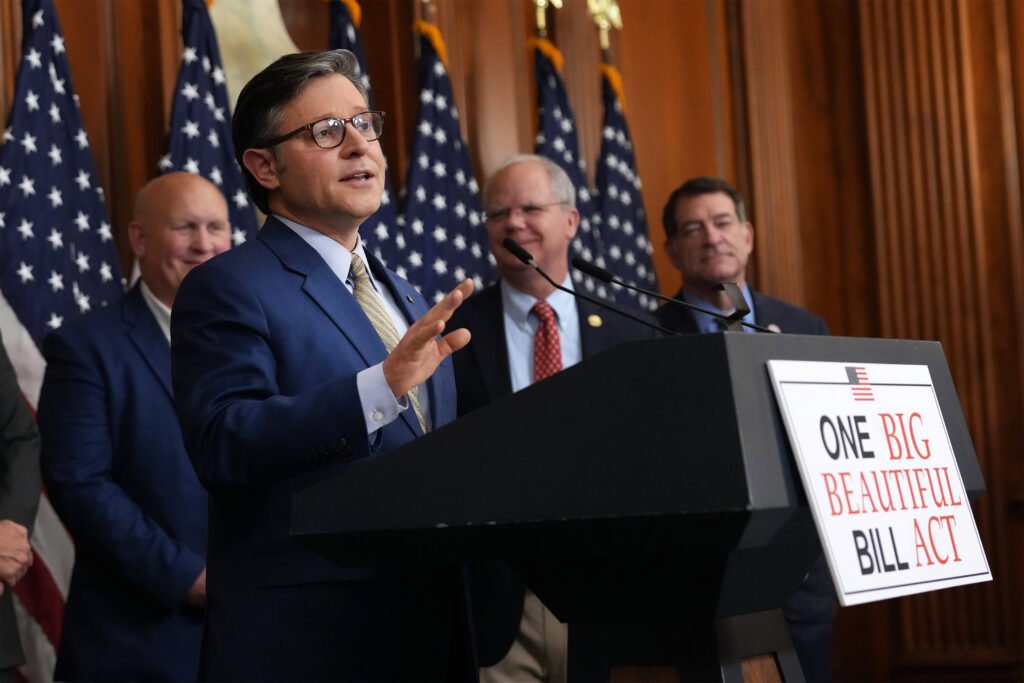President Donald Trump’s proposed budget legislation is causing concern for 14 states that offer health coverage to individuals in the U.S. without authorization. These states, mostly led by Democrats, provide insurance to low-income immigrants, including children, regardless of their legal status. While advocates argue that this policy is both compassionate and cost-effective, the federal legislation, known as the “One Big Beautiful Bill” by Republicans, would significantly reduce federal Medicaid reimbursements to these states unless they scale back these benefits.
The bill recently passed in the House and is now heading to the Senate for consideration. In addition to implementing various aspects of Trump’s domestic agenda, such as tax cuts benefiting the wealthy, the legislation also includes significant cuts to Medicaid that could leave millions of low-income individuals without health insurance.
If approved by the Senate, the cuts would present a challenging political and economic dilemma for the affected states and Washington, D.C., which currently use their own funds to provide health coverage to individuals in the U.S. without authorization. These states would face a reduction of 10 percentage points in federal reimbursement for individuals covered under the Medicaid expansion of the Affordable Care Act. California, the state with the most at stake, could lose up to $3 billion annually as a result of these cuts.
In total, the 15 impacted states cover approximately 1.9 million immigrants without legal status. The penalty could potentially extend to other states that cover lawfully residing immigrants as well. States like Utah and Illinois have laws that would automatically terminate their Medicaid expansions if federal funding is reduced, putting even more low-income individuals at risk of losing their health coverage.
The financial impact of these cuts would be substantial for the states and Washington, D.C., requiring them to find additional funds to make up for the lost federal Medicaid reimbursements if they continue to provide coverage to individuals without authorization. California and New York are among the states that stand to lose the most federal funding under this legislation.
California Senator Scott Wiener emphasized the state’s commitment to universal healthcare and expressed the need to resist the proposed changes. Governor Gavin Newsom warned that the bill could have devastating consequences on healthcare in California, potentially leading to loss of coverage, hospital closures, and collapse of safety nets. Newsom also raised concerns about the legality of Congress penalizing states for their healthcare spending decisions and hinted at the possibility of legal challenges.
In Utah, state Rep. Jim Dunnigan stressed the importance of maintaining Medicaid expansion, which covers thousands of individuals, including children. The potential loss of federal funding poses a significant challenge for the state, with limited alternatives available. Similarly, Illinois could see hundreds of thousands of adults losing their health coverage if the penalty is enforced, prompting discussions on potential solutions to mitigate the impact.
Critics of the House bill argue that it unfairly targets Democratic-controlled states that provide healthcare to immigrants without legal status. They view the provision as reflective of Republicans’ hostility towards immigrants and their desire to restrict public coverage for this population. House Speaker Mike Johnson justified the penalty as a measure to deter unauthorized immigration and suggested that public opinion supports efforts to limit coverage for this group.
The proposed legislation also includes other measures to reduce federal Medicaid spending, such as requiring states to verify the employment status of Medicaid recipients and increasing the frequency of eligibility recertification. Additionally, the bill would halt states’ ability to use taxes on healthcare providers to fund their share of Medicaid costs.
The Congressional Budget Office estimates that, if enacted, the House bill would result in millions more people being without health insurance by 2034. This number could increase further if the enhanced premium subsidies for Obamacare plans expire, as expected. These subsidies, a key initiative of former President Joe Biden, have been instrumental in making healthcare more affordable for many individuals.
In conclusion, the proposed budget legislation has sparked debate and raised concerns among states that provide healthcare to individuals without authorization. The potential impact of the cuts to federal Medicaid reimbursements underscores the complex challenges facing these states in maintaining coverage for vulnerable populations. As the bill progresses to the Senate, the future of healthcare for millions of low-income individuals hangs in the balance.


